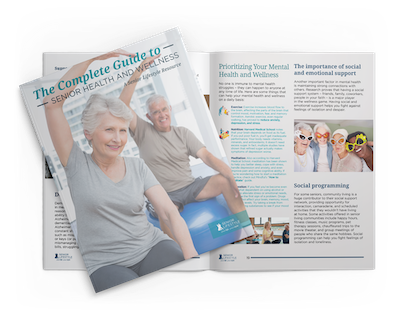What You Need To Know About Migraines In Seniors

Migraines are more than just headaches; they are debilitating neurological conditions that affect millions of people worldwide. While commonly seen in younger people, migraines can also strike seniors, but differently.
Find out what you need to know about migraines in seniors, and explore their causes, symptoms, and effective management strategies.
What Sets Migraines Apart?
Migraine headaches occur repeatedly, with sufferers reporting moderate to severe head pain, often accompanied by other symptoms, such as nausea, vomiting, sensitivity to light and sound, and visual disturbances. These headaches typically can last anywhere from a few hours to several days, with the intensity of the pain varying from person to person and from one episode to the next. Migraines can be debilitating, significantly impairing a person’s ability to function in daily life.
In seniors, migraines may look different and be more challenging to diagnose. Unlike younger people who may experience migraines with aura (visual disturbances, such as flashing lights or zigzag lines), seniors are more likely to have migraines without aura. Also, seniors may be more prone to silent migraines, experiencing aura symptoms without the headache itself.
Download The Complete Guide to Senior Health and Wellness
As people grow older, their health and wellness needs change. Read our eBook, "The Complete Guide to Health & Wellness for Seniors" for everything you need to know about staying healthy and happy as we age.
Download the GuideCauses of Migraines in Seniors
There are several factors that lead to migraines in seniors. Here are some common causes:
Age-Related Changes in the Brain
As people age, structural and functional changes occur in the brain, including how the brain reacts, how it transmits messages, and how blood flows. These changes may make seniors more likely to have migraine attacks or may change what migraine symptoms look like.
Also, the brains of seniors may become less flexible and effective at managing migraine triggers and pain, making them more prone to migraines.
Hormonal Fluctuations
Although hormone fluctuations are often linked to migraines in younger women, hormonal changes persist as both men and women grow older. Changes in estrogen, progesterone, and testosterone levels can still trigger or worsen migraines in seniors.
Menopause in women and andropause in men are major hormonal changes that may lead to more frequent or severe migraines because of hormonal imbalances.
Vascular and Cardiovascular Factors
Seniors often experience age-related changes in the vascular system, such as arterial stiffness, heart disease, and alterations in blood vessel structure and function. These changes can impact blood flow to the head and make seniors more prone to migraine attacks.
Some cardiovascular conditions, including hypertension, atherosclerosis, and ischemic heart disease, may also contribute to migraines.
Medication Side Effects
Seniors are more likely to take multiple medications to manage their chronic health conditions, increasing the risk of medication-induced migraines as a side effect. Certain medications commonly prescribed to seniors, such as vasodilators, calcium channel blockers, and nitroglycerin, may trigger or exacerbate migraines.
Taking multiple drugs and drug interactions can complicate migraine management in seniors. Seniors experiencing migraines should have their medications evaluated by their physician and should consider alternative treatment options with lower migraine-inducing potential.
Comorbid Health Conditions
Seniors often have a higher prevalence of comorbid, or multiple chronic, health conditions, such as hypertension, diabetes, obesity, and mood disorders. These conditions can make them more susceptible to migraines or can exacerbate migraine symptoms.
In seniors, migraines often come alongside chronic pain, musculoskeletal issues, and neurological disorders. This makes managing and treating migraines more complicated.
Lifestyle and Environmental Factors
Age-related changes in lifestyle habits, including changes in sleep patterns, eating habits, physical activity levels, and stress management strategies, can influence migraine occurrence and severity in seniors.
Environmental factors, such as weather changes, noise pollution, bright lights, and strong odors may act as triggers for migraines in seniors. To battle this, seniors may need to modify their environment or lifestyle to minimize exposure to triggers.
Symptoms of Migraines in Seniors
While the main symptoms of migraines remain consistent across age groups, seniors may experience additional challenges due to other health- or age-related conditions. Symptoms may include:
- Cognitive difficulties, such as confusion or memory problems
- Increasing severity when ascending stairs, bending over, leaning down, or walking
- Intense headaches lasting hours to days
- Nausea and vomiting
- Pain usually in just one side of the head
- Sensitivity to light, sound, or smells
- Visual disturbances
Managing and Preventing Migraines in Seniors
There are a few things seniors and those who care for them can do to prevent migraines from happening or to manage the effects when they do:
Medication Management
Seniors with migraines may benefit from medications, such as NSAIDs (nonsteroidal anti-inflammatory drugs), triptans, or preventive medications like beta-blockers or anticonvulsants. However, seniors and their caregivers must be careful to watch for potential interactions with other medications and age-related changes in metabolism.
Lifestyle Modifications
Encouraging seniors to adopt healthy lifestyle habits can help reduce migraine frequency and severity. This includes maintaining regular sleep patterns, staying hydrated, managing stress through relaxation techniques or meditation, and avoiding known triggers.
Dietary Changes
Identifying and avoiding dietary triggers can be instrumental in preventing migraine episodes. Seniors should be advised to keep a food diary to track potential triggers and make needed changes to their diet.
Regular Exercise
Engaging in regular physical activity can help improve overall health and potentially reduce the frequency and intensity of migraines. Gentle exercises, such as walking, swimming, or yoga can be beneficial for seniors.
Regular Monitoring and Communication
Seniors with migraines should maintain open communication with their healthcare providers, promptly reporting any changes in symptoms or whether treatment remains effective. Regular check-ups can help ensure that the management plan remains effective and appropriate.
Live a Healthier Life at Senior Lifestyle
Migraines can be challenging for seniors because of age- and health-related factors. By understanding the causes, symptoms, and management strategies, healthcare providers can offer tailored care to improve the quality of life for seniors living with migraines.
Senior Lifestyle communities can help seniors with health challenges. Our care is determined by your needs, whether you require Memory Care, Assisted Living, or Independent Living. Our trained team members will assist with everyday needs to help you live comfortably.
Find out more about Senior Lifestyle or schedule a visit today.
The post What You Need to Know About Migraines in Seniors appeared first on Senior Lifestyle.


